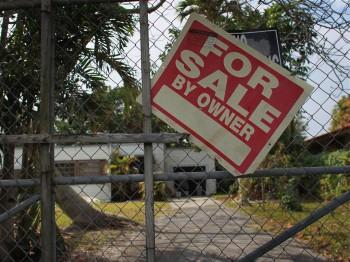Property Deeds Fraught With Problems
What is not public knowledge is that a title or a deed to a property, which should de facto decree full ownership, may not in fact do so, thus requiring costly litigation.

DEED CONFUSION: A for sale sign is seen in front of a home in Miami, Fla., in this file photo. The Mortgage Electronic Registration Systems Inc. (MERS), a computerized system established to hold and track mortgages, has caused confusion in tracing the chain of title for U.S. properties. Joe Raedle/Getty Images
|Updated:





